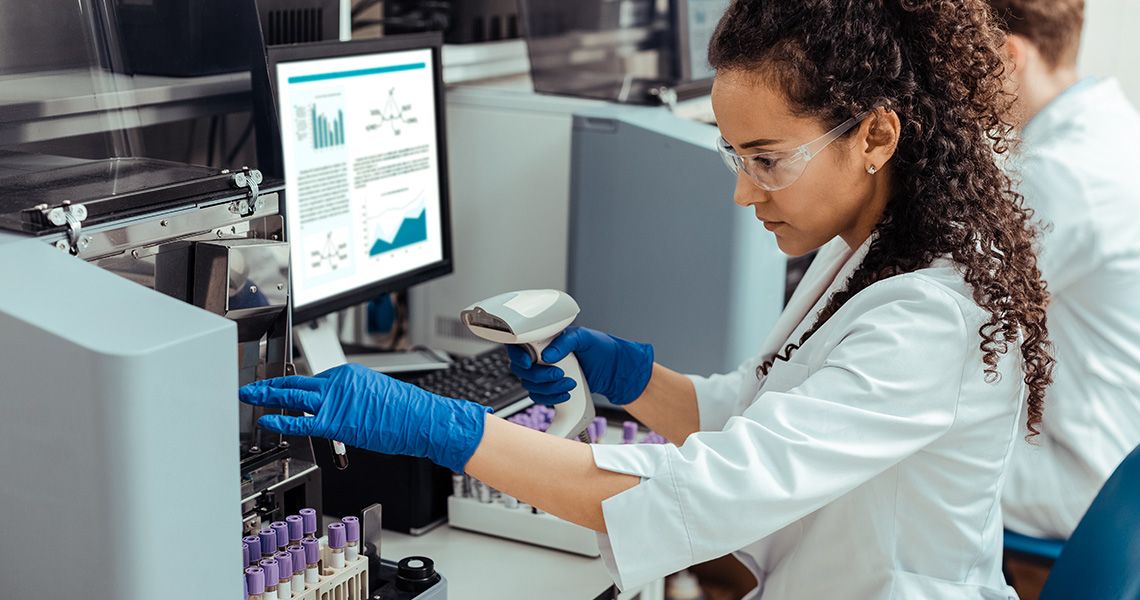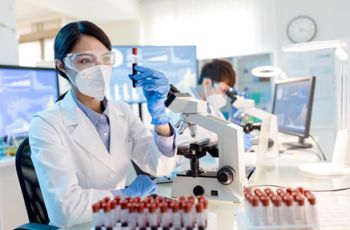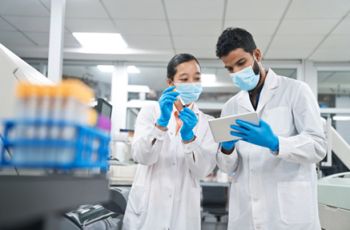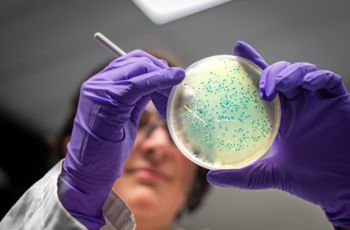In the dynamic landscape of modern medicine, medical laboratory scientists play a critical role in connecting patient care, diagnostics and scientific inquiry. Behind every precise diagnosis and groundbreaking medical discovery, there is a team of professionals dedicated to unraveling life-changing insights within laboratory samples.
Also referred to as medical technologists, and clinical laboratory scientists, medical laboratory scientists have a direct influence on patient care and outcomes, impacting the well-informed decisions made by health care providers. The detailed work performed by these professionals requires specialized education and training to ensure efficient and accurate analysis.
Learn more about this in-demand role and explore how to become a medical laboratory scientist. Keep reading to review the full process, or jump to a specific step by clicking on one of the steps below:
How to become a medical laboratory scientist:
1.Earn the necessary education
2.Obtain MLS certification
3.Pursue categorical certification
4.Consider specialist-level certification
5.Acquire state licensure
How do you become a medical laboratory scientist?
Medical laboratory science (MLS) professionals perform a wide range of laboratory tests that aid in the diagnosis, treatment, and prevention of diseases. Their work has a profound impact on the delivery of patient care, ensuring high-quality and informed decision-making.
If you’re curious about how to become a medical laboratory scientist and tap into this high-impact, high-demand field, review the following steps:
1. Earn the necessary education
To qualify for these roles, individuals typically need a bachelor’s degree in MLS or a related field. Keep in mind, however, that you may have more than one option available when it comes to medical laboratory science education.
The Bachelor of Health Sciences in Medical Laboratory Sciences at the George Washington University (GW), for example, offers two routes for completion, depending on your existing qualifications:
- Those who have already achieved their Medical Laboratory Technician (MLT) certification can enroll in the fully online MLT-to-MLS program, which can be completed in approximately 28 months.
- Students who have not obtained their MLT certification can participate in GW’s hybrid MLS track, which includes a combination of online and in-person courses and can be completed in roughly 24 months.
Both bachelor’s programs equip students with the knowledge and skills needed to be successful in this challenging and rewarding health care career path.
For those who have earned a bachelor’s degree in an alternate field, there are also post-baccalaureate certificate and master’s degree programs to consider:
- The Post-Baccalaureate Certificate in Medical Laboratory Science at GW provides students with the competencies needed to become Board Certified as laboratory scientists in just 20 months.
- The Master of Science in Health Sciences (MSHS) in Laboratory Medicine program provides students with the competencies needed to become MLS Board Certified in 24 months.
Regardless of the type of MLS program you choose, it’s important to note that clinical training is an essential component of a quality medical laboratory science education path. You’ll want to choose a program that sets its students up for success when it comes to practical, hands-on learning opportunities. The MLS programs at GW prioritize applied, real-world experience, maintaining more than 100 clinical affiliations throughout the country.
Finally, it’s important to do some research to ensure the programs you’re examining meet industry standards. The most effective way to do this is by looking for an MLS program that has been accredited by the National Accrediting Agency for Clinical Laboratory Science (NAACLS). As a recognized accrediting body, NAACLS is committed to ensuring the quality and advancement of education in medical/clinical laboratory sciences.
2. Obtain MLS certification
MLS Board Certification is a prestigious and recognized credential that signifies a medical laboratory scientist’s commitment to excellence, professionalism, and ongoing education in the field. Employers often value and prioritize candidates who have obtained this certification.
While Board Certification is not strictly required in this role, it is strongly encouraged. The gold standard in the industry is the American Society of Clinical Pathology (ASCP) Medical Laboratory Scientist certification. Having credentialed more than 600,000 individuals, the organization continually sets a high standard for quality and continuing competency within the MLS field.
Students who complete the MLS programs at GW will be qualified to sit for the ASCP MLS Board of Certification exam. In fact, GW graduates have achieved an impressive 93.03 percent overall five-year pass rate for the exam, compared to the 78.60 percent national average.
3. Pursue categorical certification
Individuals who are MLT-certified or baccalaureate-qualified and want to work in a specific laboratory area may also choose to seek out opportunities to obtain categorical certifications within the medical laboratory science field.
Consider the following examples of categorical positions that may require this type of certification:
- Blood bank technologists perform routine and specialized tests in blood banking and transfusion services to determine blood types, identify antibodies and select blood components to support providers in blood transfusion therapy.
- Clinical chemistry technologists perform analyses on blood and body fluids to determine the presence or quantity of chemical and/or hormonal content in the specimen to aid in the diagnosis and treatment of diseases.
- Cytogenetics technologists perform various techniques to determine the diagnosis, prognosis and treatment of inherited and acquired genetic diseases.
- Cytologists prepare and evaluate human cellular samples from all body sites to aid pathologists in detecting pre-cancerous changes, cancer, benign tumors, infectious agents and inflammatory processes.
- Hematology technologists perform analyses of blood and body fluids to identify hematologic and coagulation disorders, aiding in the diagnosis and treatment of diseases.
- Histotechnologists perform routine and complex histologic techniques, such as enzyme histochemistry, immunohistochemistry and immunofluorescence on tissue samples for microscopic examination by pathologists.
- Microbiology technologists identify bacteria and microorganisms in tissue samples and body fluids to aid in the diagnosis and treatment of infectious diseases.
- Molecular biology technologists use advanced techniques like sequencing and genomic analysis to detect and characterize acquired and inherited conditions, including malignant, metabolic and infectious diseases.
The educational and training requirements for each of these MLS careers will vary, but they typically include specific clinical experience and a passing score on a categorical Board of Certification exam.
The Biomedical Laboratory Sciences department at GW offers post-baccalaureate and master’s degree programs for many of these categorical areas, providing eligibility for individuals to take their respective Board of Certification exams. There are a range of graduate certificate programs, including:
- Post-Baccalaureate Certificate in Blood Banking for Medical Laboratory Science
- Post-Baccalaureate Certificate in Chemistry for Medical Laboratory Science
- Post-Baccalaureate Certificate in Hematology for Medical Laboratory Science
- Post-Baccalaureate Certificate in Microbiology for Medical Laboratory Science
- Post-Baccalaureate Certificate in Molecular Diagnostic Science
While specifics can vary, these post-baccalaureate certificate programs can be completed in approximately 12 months. GW also offers MSHS degree programs in Clinical Microbiology and Molecular Diagnostic Sciences.
4. Consider specialist-level certification
There are also opportunities for MLS-certified professionals to advance further by obtaining a specialist certification in a specific area. Below are various specialist certifications available through the ASCP:
- Specialist in Blood Banking (SBB)
- Specialist in Chemistry (SC)
- Specialist in Cytology (SCT)
- Specialist in Cytometry (SCYM)
- Specialist in Hematology (SH)
- Specialist in Microbiology (SM)
- Specialist in Molecular Biology (SMB)
The educational and training requirements for each specialization will vary, but they typically include completion of specific certification requirements, a minimum number of years of full-time laboratory experience and a passing score on a specialist Board of Certification exam.
MLS professionals who are interested in pursuing specialist-level certification may feel the need to refresh their knowledge of the theoretical components that will be included on the specialist certification examinations. The GW post-baccalaureate certificate and master’s programs highlighted above have been designed to provide the insight required for a successful exam experience.
5. Acquire state licensure (if applicable)
Completion of a bachelor’s program in MLS like the ones at GW will make graduates eligible to sit for the ASCP Board of Certification exam. However, this does not automatically guarantee that a graduate will also meet their state licensure requirement (if applicable).
Since each state that has licensure has unique requirements, students are always advised to contact their state’s regulating agency and review the medical laboratory scientist requirements prior to beginning any degree program.
Students considering the MLS programs at GW are encouraged to reach out to an Enrollment Advisor to inquire about their specific circumstances regarding state licensure. GW is committed to monitoring changes regarding regulations in the field and assisting students with the steps they need to take in order to practice.
Take the first step toward becoming a medical laboratory scientist
In the ever-evolving health care field, the role of medical laboratory scientists stands as a linchpin connecting the dots between diagnostics, patient care, and scientific discovery. If you’re interested in a career in this rewarding, high-demand field, you should now have a clearer understanding of how to become a medical laboratory scientist.
It all starts with choosing a reputable program with proven student outcomes. At GW, more than 95 percent of MLS program graduates are employed in the field within three months of program completion.
To learn more about our nationally recognized MLS education offerings, explore the George Washington University Medical Laboratory Sciences programs.



